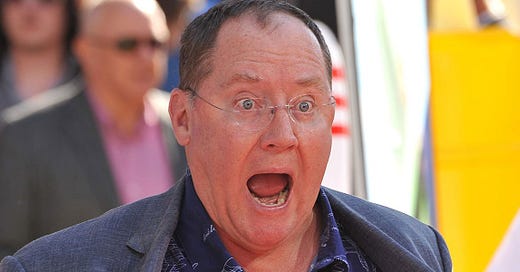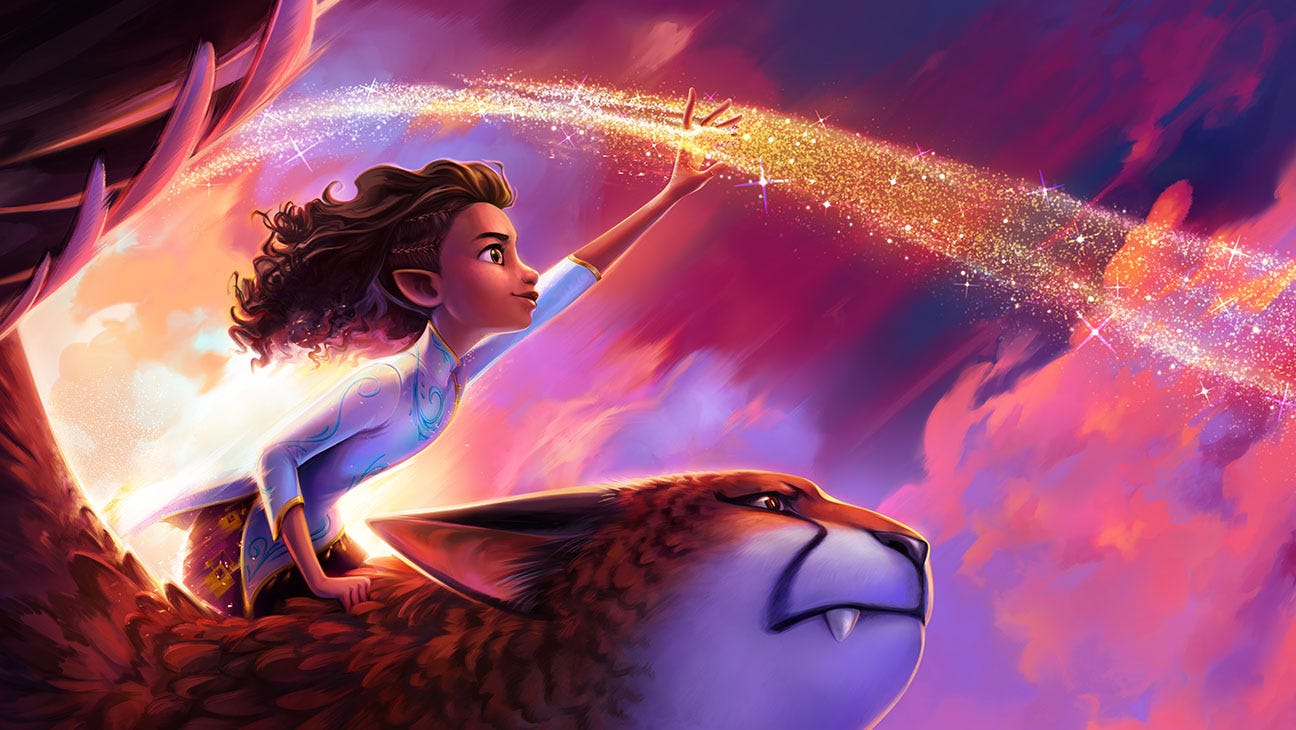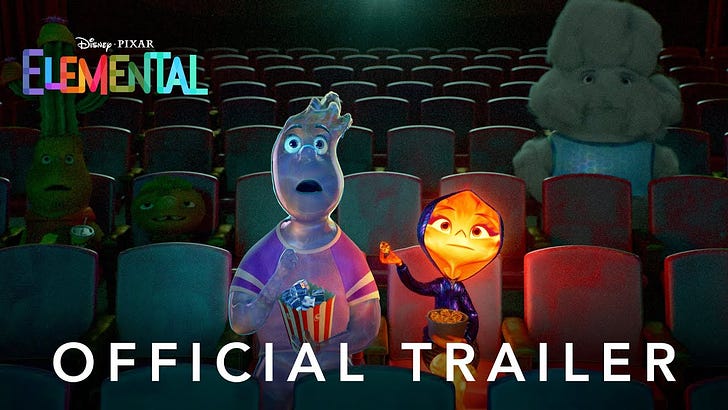Lasseter Drops Apple, Picks Up the Ball at Netflix Animation
Kids Headlines: Netflix Q3 2023 Earnings - Part 1
I’m not going to lie to you, my rosé-recovering, post-MIPCOM self was hoping for a relatively chilled Netflix earnings. I even had 900 words down in advance, covering content performance and more context on the recent metric evolution.
As if…
I think this is officially the biggest news affecting the kids media space ever announced directly by Netflix at an earnings call.
Just to get the typical stuff quickly out of the way, all the usual metrics Wall Street is obsessed with were very positive. Subscribers are up—2023 is looking phenomenally better than 2022 on that front. The password-sharing crackdown is paying off. Subscription prices are going up in some markets. If you’re looking for a deep dive on all that, I suggest you check out Lucas Shaw at Bloomberg.
Major Jaw Dropper for the Animation Industry
For those of us who work in the kids sector, there is one major jaw dropper. Skydance Animation, which is currently headed by John Lasseter, has unceremoniously dropped its seemingly homely, animated feature deal at Apple TV, for a partnership at Netflix.
I am shook. This is something I would have never predicted. There had been announcements last week regarding Netflix Animation restructure and layoffs, but that news had landed, to me at least, as more of a downsizing. Not so.
Netflix do already have a partnership with Skydance Media at large. Kids titles from this include the recent Sky Kids: Armageddon. That being said, this development has to have been a massive kick in the teeth for Apple. Spellbound, which had already been announced at Apple TV+, is the first to head to Netflix in 2024. The animated musical boasts a plethora of high-end talent. In musicals, it doesn’t come higher than Alan Menken. A content gazump for the ages. Confusingly, Variety reported that:
“the companies had mutually agreed that “Spellbound’ was not a fit for Apple’s expanding narrative slate, thus necessitating its move to Netflix.”
I mean high-end, music driven animated features in streaming. Given the record of Encanto, Moana, and Frozen, what’s not to like?
From the outside you’d have every reason to think that John Lasseter was cozy and settled with Apple. There’s a strong history there. Steve Jobs founded Pixar with Lasseter (plus Ed Catmull) and was simultaneously CEO of both companies for 20 years. They were concurrently betting hard on the capabilities of computers. The synergy seems obvious.
There has been oceans of water under the bridge since then. Pixar sold to Disney, where Jobs remained on the board until his death in 2006. It went on to the great success that we’re all familiar with. Lasseter would be ushered out of the company in 2017, under the cloud of sexual misconduct. His subsequent appointment to the head of Skydance Animation in 2019 caused upset, but this ultimately settled.
At the studio, Lasseter took up the reins of Luck, an animated feature in development. This caused numerous changes among cast and crew, unhappy with his appointment. I never pass up the chance to link this devastatingly perfect letter from Emma Thompson on the matter. Between this turmoil and COVID, the film would ultimately be a straight to streaming for Apple TV+ as part of a multi-year deal.
Apple TV+ has a number of specific things going for it as a streaming service. Not least of all, the pressure of profitability is a dot, as Apple continue to cream in the profit from their core tech business. Granted household penetration is low. In the US it’s around 12% to Netflix’s 51% according to Entertainment Strategy Guy’s latest estimate. Having said that, the service has managed to curate an impressive and exclusive (also read: limited) offering of high-quality content. Ted Lasso is the standout crowd-pleasing hit. Plenty of other shows and movies have had critics’ mouths watering. In animation, the platform gave a home to the Oscar-nominated Wolfwalkers from Cartoon Saloon in 2020.
It’s fair to say Apple TV+ is fully prestige TV, without the chaff. Perhaps most crucial thing, as far as Lasseter might be concerned, is that it doesn’t have a CEO who has banged on and on about the fact that… sing it with me, Taylor… he’s NEVER EVER EVER putting movies in cinemas. And herein lies the crux in my opinion. It was literally the last edition of this newsletter where we were talking about the additive nature of a theatrical release for animated features in streaming. The data is in. Movies released in cinemas drive the same or, more usually, higher viewership on streaming compared to their direct-to counterparts. So what might Lasseter hope for Skydance?
What Could the Future Be Like?
Perhaps he’s betting that Netflix, who undoubtedly remain the dominating streaming platform, will be able to deliver that critical mass of audiences and success to his studio’s output. There could even be marketing commitment thrown in, plus a guarantee of proper consumer product activation in the newly announced bricks and mortar “Netflix House” stores. These would want to both be there as a baseline.
Going back to Lasseter’s roots for a minute, he’s used to working in “the machine” that is Disney. This includes big league marketing budgets and teams across every area of the business that activate IP across consumer products, retail, media partnerships, parks, stores, social, digital, gaming, music, you name it. That’s called franchise. Sure, it drives sweet, sweet revenue, but it also acts as a flywheel, solidifying characters in the minds and daily lives of kids and families.
My caution would be that the absence of this “machine” at Netflix was a point of undoing for some of their preschool Original animation. In a golden age, Netflix enticed proven creators onto their roster, often in multi-year deals. This ended in a lot of disappointment as shows failed to cut through the noise, without the launch pad of marketing and franchise. A particular example of this was the case of Chris Nee, who joined Netflix after a platform-defining run of franchise slam dunks at Disney Junior. From the get-go her shows struggled to find an audience on Netflix.
Could there be something else in the pipeline? Is there a softening happening? Might Sarandos be coming to the position that a proper theatrical run would actually elevate certain movies? If you need the data, I have it here for you Ted:
Animated Movies Bring Home Box Office Bacon - with a Side of Streaming
It’s been a hot minute since I wrote about animated movies on The Kids StreamerSphere. And by hot minute, I mean nearly a year. A YEAR!!! Apologies folks, I went down a massive preschool-series hole. First Gabby’s Dollhouse, then the history of Bluey
I often say we end up at the pointy end of the stick in kids media. Countless times, change hits us first, before our compatriots in the wider entertainment landscape. I wonder if this could be another one of those times.
I’ll leave it there for Netflix earnings for the minute. My standard update, including kids content performance, will hit in the next few days, once I’ve recovered from this uproar.






